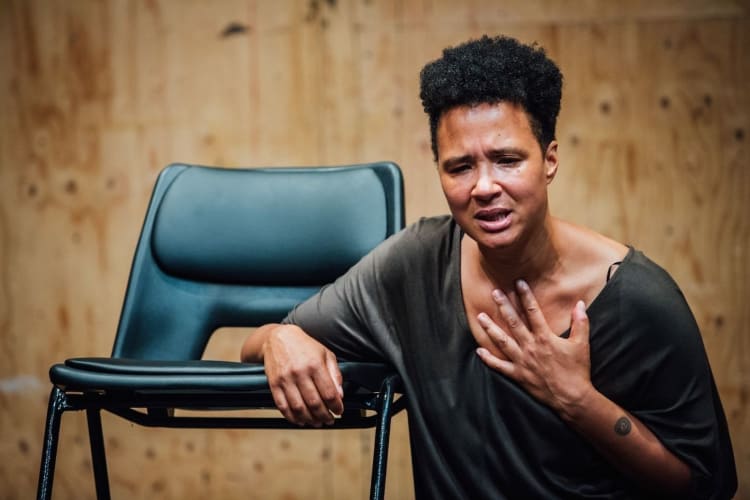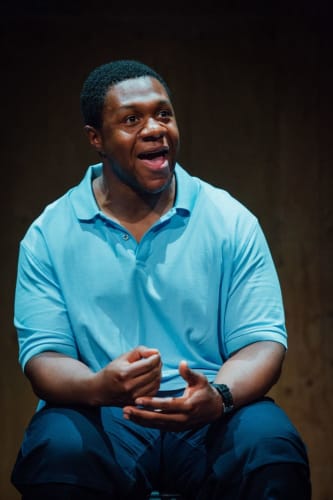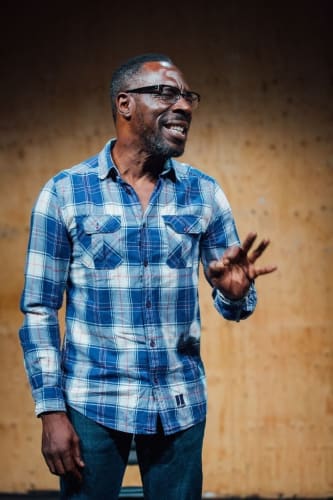What’s it like when you aren’t allowed to work or go to school, live in a hostel that you have to leave in the daytime, when you have no routine, no money, not even a bus fare in your pocket. What can you say when someone asks, “how was your day?”
That is Michael's problem, a refugee from East Africa, originally Burundi, who has no ID card. He describes himself as ”living with people at the sea level of their own hopes," but that is only part of his story, and the good part. Why is he a refugee, what forced him to flee?
This is one of four stories, stories written by the people who lived them, developed into moving drama in workshops with Deanna Rodger, Imogen Brodie and director Ian Rickson.
They are staged with great simplicity on a stage empty except for three chairs for the first part in which three actors present the personal narratives of Michael (Jonathan Livingstone), Mir (Manish Gandhi), a young Pakistani from Baluchistan, and Desmond (Gary Beadle) from Jamaica.
Although quite separate histories of people whose lives have not previously crossed, their accounts are skilfully interwoven, an actor sometimes using one of his fellows to represent someone else in his story.
The writing is totally natural, a verbatim piece created in collaboration with Deanne Rodger, matched by performances that speak from the heart. They give their reactions to England and glimpses of their lives where they come from: happy scenes and horrors.
One first impression on arrival here is that the British must be a very rich people for they can afford to air condition the whole sky; there's a picture of childhood in Africa where the family took in refugees many times, of the granddad in Pakistan who loved classical music but grandma got the children to use his records as Frisbee and smash them, of growing up different in Jamaica and feeling threatened.
Gradually, you realise that all three men are gay and come from places where that was not accepted and could put their lives in danger.
It isn’t all gloom. Desmond speaks of going to a secret gay party where for the first time he felt he belonged, not only did he see his first drag queen but tasted forbidden fruit—and liked it. As a lad, Mir (though he wasn’t called that then) and his friend Masoo were in a lift and pressed the button for the 10th floor then went down again: 20 floors of uninterrupted kissing.
But these were lives lived in the shadow of fear. Suspicion, let alone discovery, leads to victimisation, savage beatings and imprisonment. Mir escapes to study in London but is tricked back and then confined in a mental home for refusing to marry.
It is a poignant portrayal of what life can be if you don’t fit a society’s rulebook, of the cost of being different and how fortunate gay men here are for the victories their forerunners fought for.
The second half of the performance, written by Tamara McFarlane, presents us with Tamara as a young girl in Jamaica, living with her great grandmother. She is very close to her school friend Kadine, who’s come to Jamaica from Canada.
Kadine one day arrives with some tutti-frutti chewing gum and shares it around the kids playing until just one piece is left between her and Tamara. Kadine starts biting at one end and offers the other to Tamara. It is the beginning of something very special and Kadine keeps turning up with chewing gum until one night, for Tamara’s 15th birthday, she sleeps over. It is then that an inquisitive neighbour starts asking questions.
Tamara sees a man being beaten up by a crowd, his young son dragged out of the house and murdered, a tyre thrown around him and burned. She doesn’t want to endanger the girl she loves. She ends their meetings and burns the letters that Kadine writes her; but that’s not the end of the story, it has repercussions years later.
Golda Rosheuvel plays Tamara and starts her telling lying on the floor leaning on a lone chair that could be the lap of great granny. She too gives a poignant performance, her movements around the stage adding strength to the emotional impact. It is rare that a pause in a telephone conversation can have as powerful impact as the actress gives one here in a twist that makes this love seem even more tragic.
In an interview on the Young Vic web site, Tamara McFarlane said, “there are more vicious things I have been through… I wasn’t ready to put out there.” I don’t know what she has spared us but what she shares is immensely moving.
All these performances of Now We are Here are being given for free, though donations to nominated charities working with refugees are welcomed. If there are any tickets left grab them—and they are well worth a generous donation.



